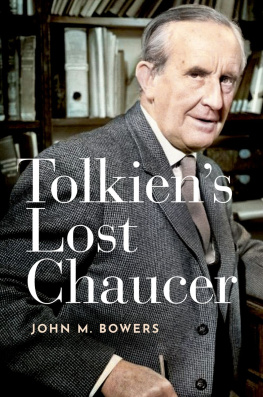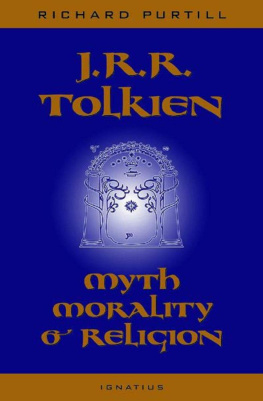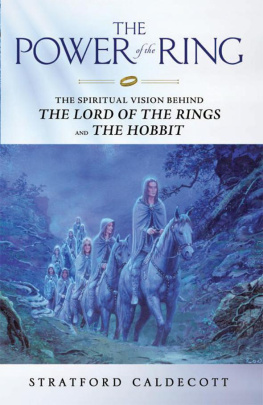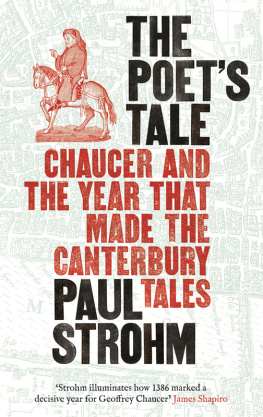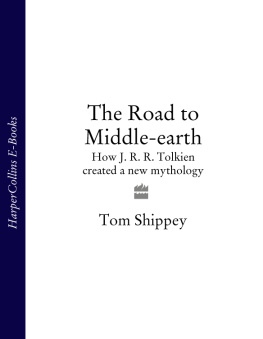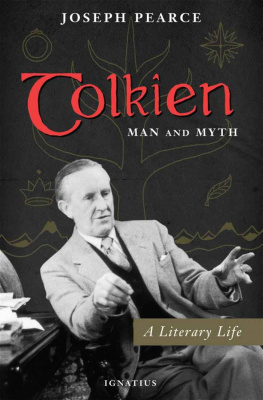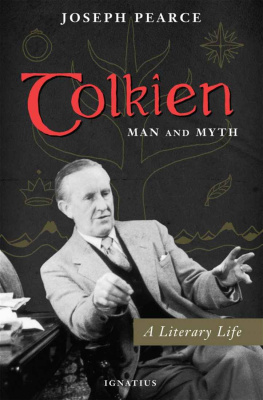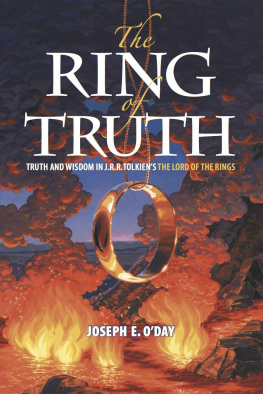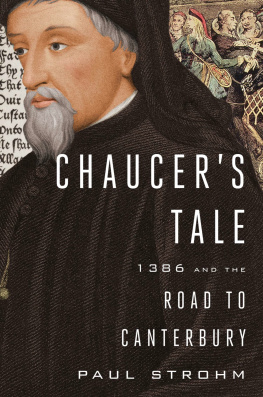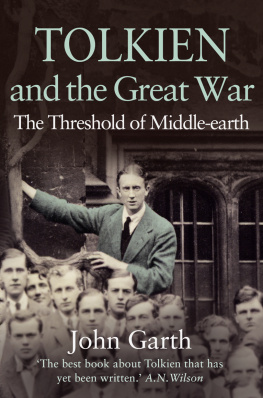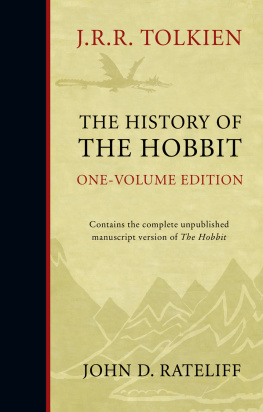Tolkiens Lost Chaucer

Great Clarendon Street, Oxford, OX2 6DP, United Kingdom
Oxford University Press is a department of the University of Oxford. It furthers the Universitys objective of excellence in research, scholarship, and education by publishing worldwide. Oxford is a registered trade mark of Oxford University Press in the UK and in certain other countries
John M. Bowers 2019
The moral rights of the author have been asserted
First Edition published in 2019
Impression: 1
All rights reserved. No part of this publication may be reproduced, stored in a retrieval system, or transmitted, in any form or by any means, without the prior permission in writing of Oxford University Press, or as expressly permitted by law, by licence or under terms agreed with the appropriate reprographics rights organization. Enquiries concerning reproduction outside the scope of the above should be sent to the Rights Department, Oxford University Press, at the address above
You must not circulate this work in any other form and you must impose this same condition on any acquirer
Published in the United States of America by Oxford University Press
198 Madison Avenue, New York, NY 10016, United States of America
British Library Cataloguing in Publication Data
Data available
Library of Congress Control Number: 2019941406
ISBN 9780198842675
ebook ISBN 9780192580306
DOI: 10.1093/oso/9780198842675.001.0001
Printed and bound by CPI Group (UK) Ltd, Croydon, CR0 4YY
Links to third party websites are provided by Oxford in good faith and for information only. Oxford disclaims any responsibility for the materials contained in any third party website referenced in this work.
Acknowledgements
No scholar works in a vacuum, especially one like myself coming late to a major author, and a number of Tolkien experts made the research more accurate as well as more enjoyable. Many of their names appear in subsequent pages but deserve mentioning here. Oxford medievalists Helen Barr and Simon Horobin referred me to local authorities who in turn referred me to other authorities. Peter Gilliver at the Dictionary Department of Oxford University Press made initial investigations, experienced as he was with the authors handwriting from his work on Tolkien as an OED lexicographer, and he introduced me to the other Dictionary staffers Jonathan Dent, Bethan Tovey, and Edmund Weiner who have been liberal with time and knowledge. Charlotte Brewer shared overlapping interests in Skeats editorial work and the OEDs history. Gilliver further connected me with Verlyn Flieger, Michael Drout, John Rateliff, and Jane Chance. Stuart Lee and Elizabeth Solopova added to the camaraderie of Oxfords medievalists turned Tolkien specialists. Christopher Stray kindly sent his forthcoming entry for Kenneth Sisam in ODNB. Kathy Lavezzo tracked down information on the independent scholar Mary Edith Thomas. Thomas Honegger was astonishingly eagle-eyed at spotting errors and suggesting improvements in an early draft. It was my very good fortune that UNLVs Black Mountain Institute hosted John Garth as Visiting Humanities Fellow in Las Vegas for the academic year 201516, with an office across the hallway from my own, and he shared unstintingly his great store of knowledge on Tolkiens life and works.
Archivists are often the unsung heroes of research projects, and huge credit goes to Martin Maw of Oxford University Press, his OUP predecessor Peter Foden, Robin Darwall-Smith of Magdalen College (who also provided many helpful comments on an early draft), Julian Reid of Merton College, and particularly Catherine McIlwaine of the Bodleian Librarys Special Collections. My gratitude to librarians begins with Kyle Felker of UNLVs Lied Library for arousing an interest in Tolkien before I knew that I had one. Colin Harris and his staff assisted gallantly under difficult conditions when the Special Collections Reading Room was exiled to the basement of the Radcliffe Science Library. James Fishwick of Magdalen College Library unearthed publications by George Gordon. Other rare volumes by Gordon were provided by Susan Usher, English Subject Librarian at Oxfords English Faculty Library; she also provided me with a scan of catalogue cards for Tolkiens Celtic Library donated upon his retirement in 1959 and transferred in 2015 to the Bodleians Weston Library where it is now part of the Tolkien Archive. Michael Spurling and his staff at the Oxford University Press Library were unfailingly helpful and good-humoured during my two summers in their midst.
Merton College made this venture possible by hosting me grandly during the summers of 2013 and 2014. My thanks go to the Warden Sir Martin Taylor and the Fellows, particularly Richard McCabe, Steven Gunn, Stuart Lee, Julia Walworth, and Domestic Bursar Douglas J. Bamber.
Early overviews of this project were presented at biennial congresses of the New Chaucer Society in Portland in July 2012 and in Reykjavik in July 2014. Tony Edwards is always astonishing for how much he knows and generously shares, notably as a commentator on this entire book in draft form. Bruce Holsinger invited a talk for the Medieval Colloquium at the University of Virginia in October 2014 during my much-appreciated sabbatical from the University of Nevada Las Vegas. In attendance was A. C. Spearing who had met Tolkien when he came to Cambridge in 1964 for the election of a successor to C. S. Lewiss professorship. I wish to express my thanks to Professor Spearing and others who shared their remembrances of Tolkien: John Burrow, Anne Hudson, Peter Dronke, Prosser Gifford, Carter Revard, Derek Brewer, Derek Pearsall, and Roger Highfield. Celia Sisam in retirement on the Scilly Isles kindly read the manuscript and found nothing obviously wrong about her father Kenneth Sisam. V. A. Kolve not only shared his recollections of Tolkien as a teacher in the 1950s but also read an early draft of this book with the same careful attention as when supervising my doctoral dissertation. More times than I can count, my graduate research assistant Peter Steffensen kept me from blunders of citation and quotation.
Cathleen Blackburn of Maier Blackburn granted permission on behalf of the Tolkien Estate for having photocopies of Clarendon Chaucer materials and for using quotations in this book from Tolkiens previously unpublished writings. I am grateful for her quick and generous attentions. Letters from OUPs Clarendon Chaucer file for the years 192260 are quoted by permission of the Secretary to the Delegates of Oxford University Press.
When reproducing manuscript quotations, I have followed Christopher Tolkiens lead for expanding abbreviations and applying better punctuation and more consistent capitalization. I share everyones sense of challenge with handwriting sometimes impossible to read with certainty, and I occasionally make my own best guesses without cluttering the text with brackets to signal conjectures. Tolkiens typewriter produced italics; when he underlined in his handwritten drafts, these were intended as italics and have been reproduced as such. I make reference to The Lord of the Rings by volumes, books, and chapters (e.g. FR II/2) since these have not changed over several different editions whereas page-numbers have. Every fact, date, and piece of background information not otherwise noted can be assumed to come from Christina Scull and Wayne G. Hammonds magisterial three-volume J. R. R. Tolkien Companion and Guide, the value of which cannot be overestimated. Lastly, I want to thank OUPs copyeditor Dorothy McCarthy for the final stage of improvements; if Tolkien suspected that Chaucers scribes changed his spellings to fifteenth-century norms, she has changed my spellings to the British usages which would surely have pleased Tolkien.

